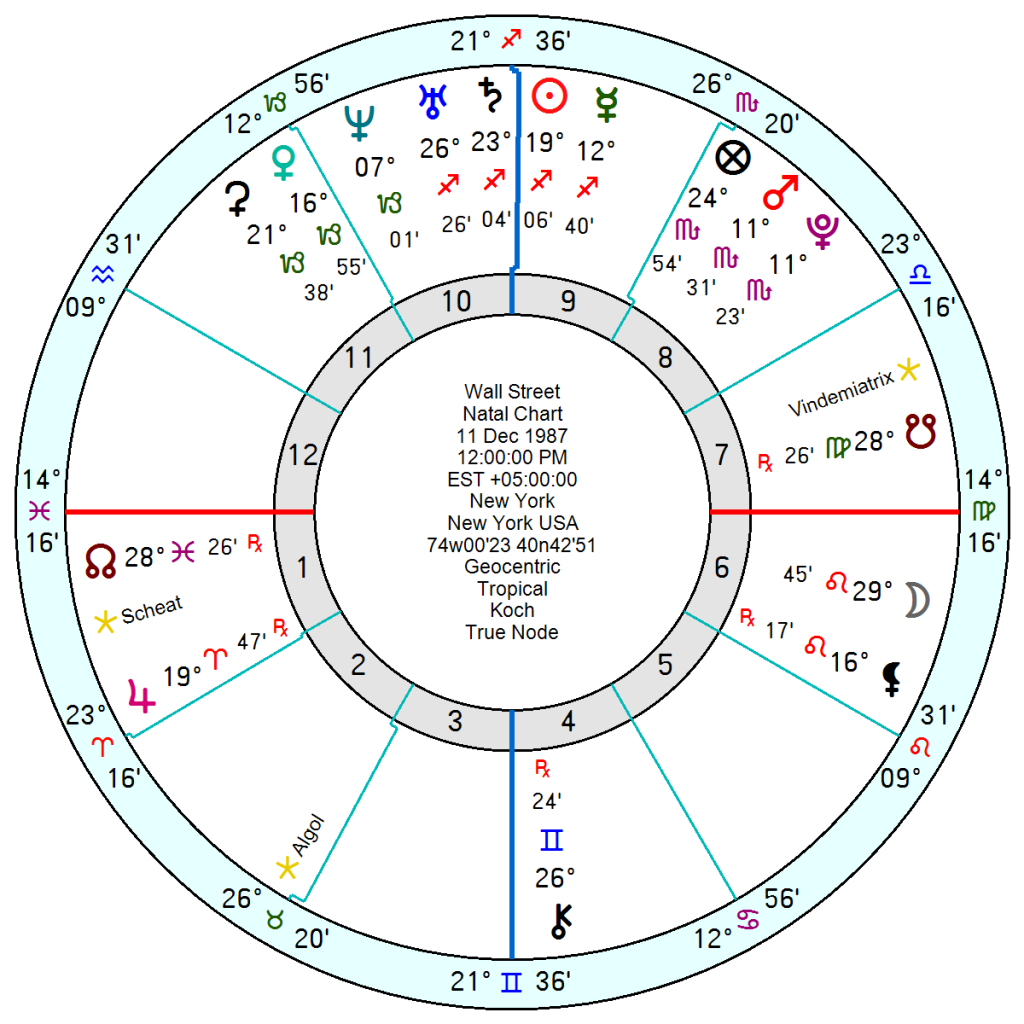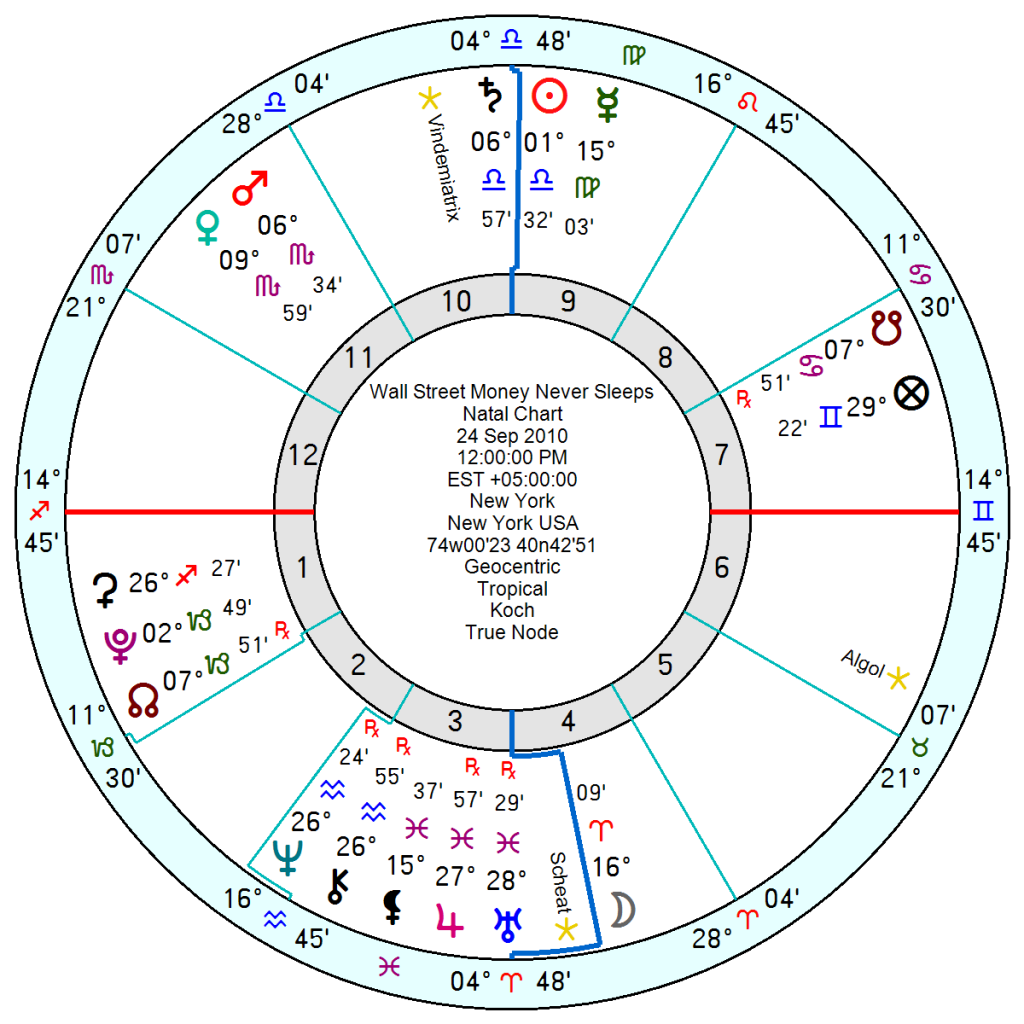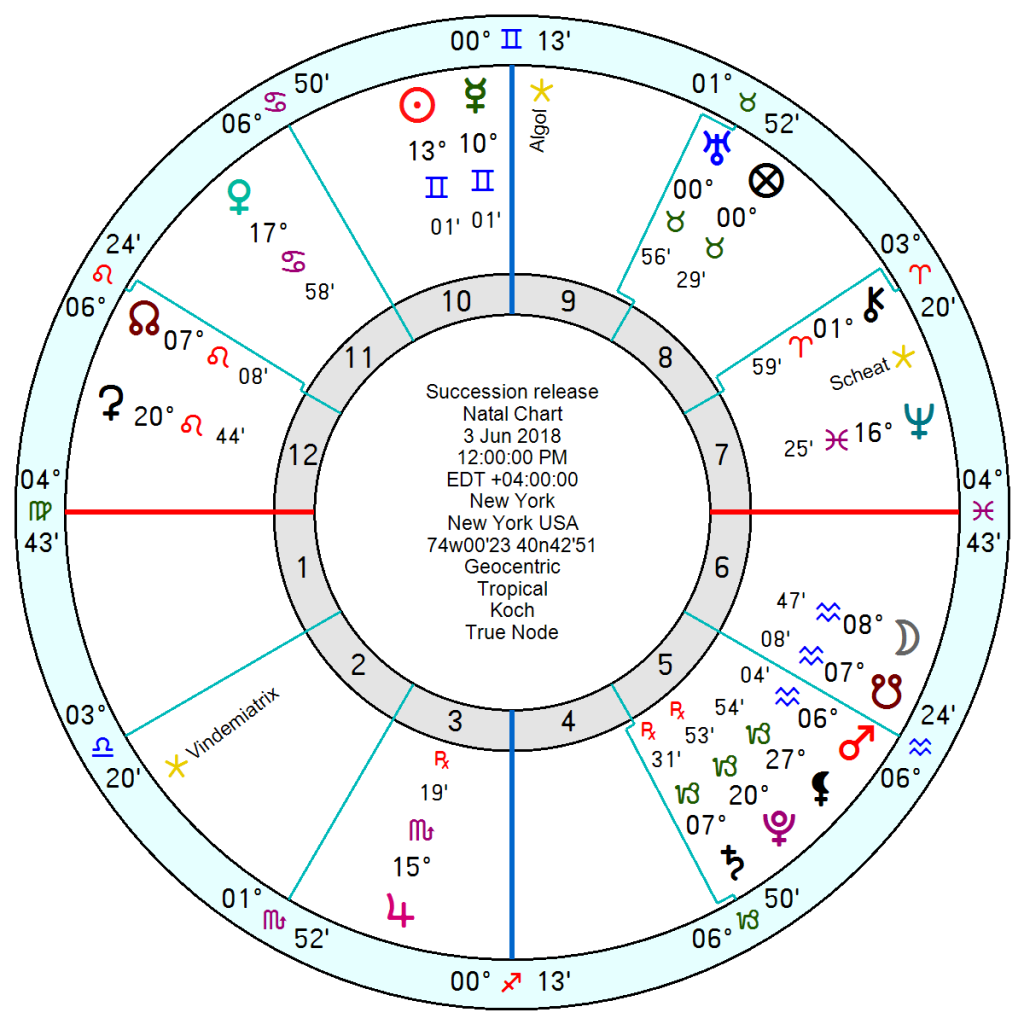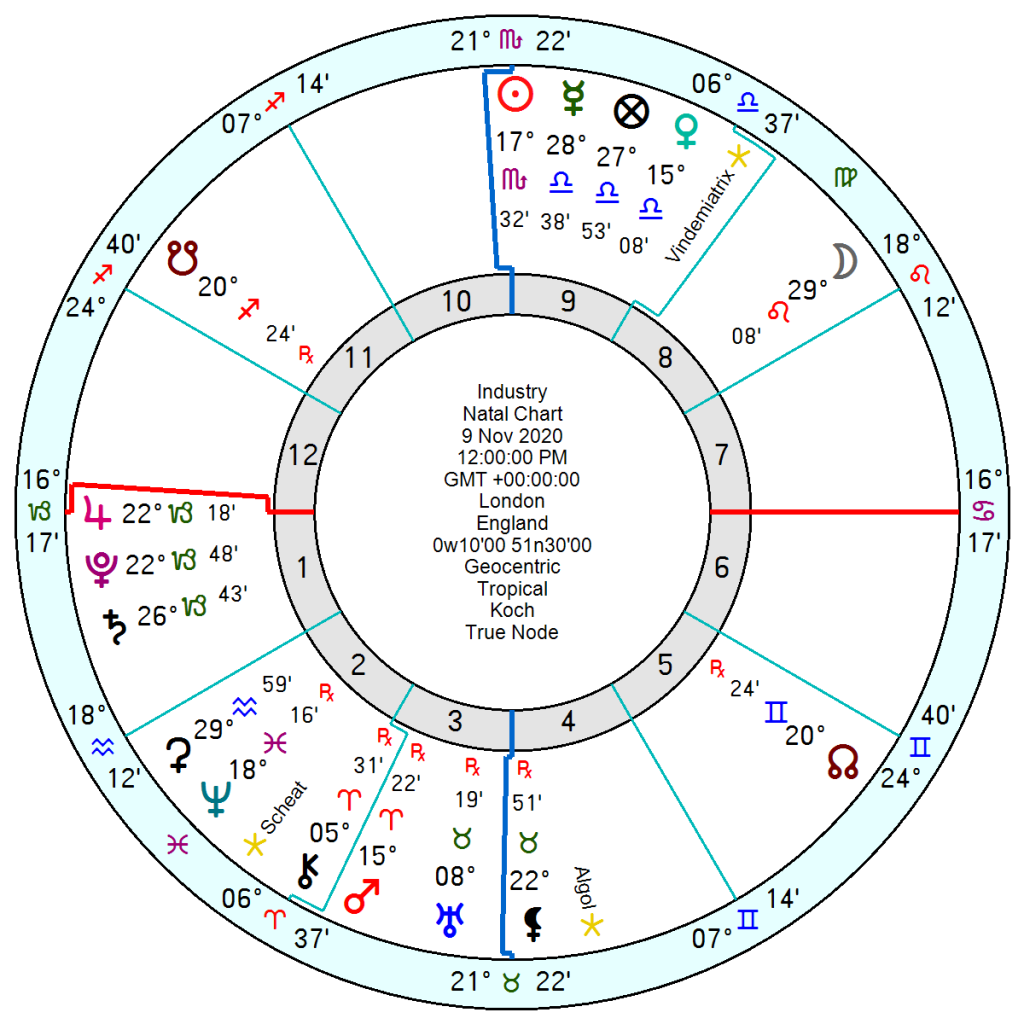




Greed has always been one of the deadly sins but more obvious recently with the Thatcherite and Reaganite 1980s taking off the restraints and allowing capitalism to run rampant as Pluto powered through Scorpio. Which all ended up in tears in 2008 as Pluto entered Capricorn with the financial crash, theoretically showing the limits and consequences of neoliberalism. Though the money men barely broke stride, merely regrouping to continue much as before.
This is a hotch potch piece more questions than answers. Puzzling over SD’s comment about 1979 being a pivotal year as Thatcher/neoliberalism came in, as did the Islamic Republic in Iran, the Soviets invaded Afghanistan; China was revving up to become a major economic power and just before in 1977 the right-wing Likud (Netanyahu/Sharon’s Party) took power in Israel for the first time which was a key turning point.
In 1979 itself Pluto Uranus Neptune were all around mid degree or just after as was the Virgo North Node. So the Node/Uranus midpoint was conjunct Pluto and the Pluto/Neptune midpoint was conjunct Uranus. In a slightly obscure way, both of those point to a shift in power. Uranus/Node is about reform or change and Pluto wants to grab control of that. Neptune/Pluto has megalomaniac ambition and Uranus aims to upset the status quo where power is concerned. Neptune/Pluto is also about delusional ideas.
Pluto did not move into Scorpio until late 1983 which would certainly coincide with money and power becoming a potential obsession, sticking around until 1995. It was also going to ground down the USSR with its Scorpio/heavily Fixed chart. So the Afghanistan debacle was merely a forerunner to the break up of the Soviet Union at the end of the decade. Israel also has a substantially Fixed chart so Pluto moving through Scorpio would have a considerable impact.
What started this somewhat tortuous thought process was catching the latest season of ‘Industry’, a drama about employees in an investment bank, last night on television which I had missed before. Hugely well reviewed it has been likened to Succession about a Murdoch type mega-wealthy family. I disliked Succession with a passion and occasionally dipped back in to see why everyone else thought it was the best thing ever and left none the wiser. Industry is every bit as unpleasant. Gordon Gekko writ large and deeply unattractive characters. If our culture is not hooked into murder, it is into greed.
The first Gordon Gekko Wall Street movie launched in 1987 on Mars Pluto in Scorpio which figures. The Wall Street sequel hit screens as Pluto moved into Capricorn in 2010. Succession, 3 June 2018, had an emphasized Pluto as the driving planet of a Kite from Water Grand Trine of Jupiter, Neptune, Venus. Industry, 9 November 2020, had an even more jacked-up Pluto in Capricorn conjunct Saturn and Jupiter.
All I can offer to SD as an astro-explanation for 1979 onwards – is the cumulative effect of Pluto in Scorpio sowing the seeds of a movement that imploded at the end of the Pluto cycle two signs on in 2008 and hopefully will run into another grinding down as Pluto moves into Aquarius. Though why 1979 is so marked with events is still unclear given that Pluto is half a sign before a shift.
Historically Pluto on a zodiacal cycle tends to accompany the rise of empires which collapse on their first or second Pluto Return. Shorter term it may also signal the end of what started two or three signs back – Scorpio, Sagittarius, Capricorn.

Not sure if this adds anything, but the Pluto in Virgo generation came of age around 1979 or so. After the Boomers of the Pluto in Leo generation, the Pluto in Virgo generation suddenly faced unemployment and skyrocketing housing costs. Some have dubbed those born from 1955 to 1965 at Generation Jones not part of the Baby Boom, jonesing for what our older cohorts had. Instead of having the Pluto in Leo focus on self-expression comes the Pluto in Virgo seriousness and need to work. I was born in 1958 with Pluto in early Virgo, graduated college in 1980. No bumming around the country looking to find myself, except find myself a job!
exactly my experience, Les… I am also born in 1958.. Pluto at 0 Virgo.
Many of my close friends are Boomers and I most certainly have had my boat in their wake!
I’ve often said I was born too late, or that I must be the first Gen X baby!!
Us early Pluto in Virgo people occupy this transition zone… some dribbling, sort of leftover, benefits but always it comes down to effort and elbow grease.
One older friend (not an astrologer) sees this clearly… his words.. “you got shafted!”.
Mind you.. I’ve had some great experiences with them and have benefited in many ways.
I do watch envy creeping in often enough. Then I remember my parents generation.. Pluto in Cancer… they had it much rougher than me!
“they had it much rougher”
Well, that doesn;t help when the cats are hungry and you hvnt eaten in two days.
Oh, and the lock-out notice was just stuck into the door jamb.
There is nothing new about human greed. I think the interesting thing about the period 1979 to 2008 was that it became regarded as a virtue and it permeated culture at all levels from the “loadsofmoney” City traders in London to the black rap artists of urban America. Being poor was not just seen as misfortune but a vice to be despised and laughed at. It was an era of western triumphalism as the old Communist regimes in Europe slowly fell apart.
Interesting that Neptune was exactly square the lunar nodes on 7 February 1979 as it crossed the orbit of Pluto. What happened at that time was quite a profound cultural shift in beliefs as money was almost literally raised to the level of worship in the west.
As you say, greed is nothing new – nor warnings against it, such as the tale of King Midas and his deadly ‘golden’ touch. The drive to acquire more can be alluring, and spur on success. The drive to never stop aiming for more is destructive. Maybe the Pluto/Uranus cycle has something to do with it? Power and wealth, change and upheaveal…
Re 1979, the song ‘Money, That’s What I Want’ was released that summer in a new version by the Flying Lizards. Pluto was 16 Libra, Uranus 16 Scorpio, Neptune 18 Sagittarius. When Pink Floyd had an enduring hit with Money, 1973, Uranus was then 19 Libra. 1972 saw the movie Cabaret, featuring the song Money, Money, Money. Uranus 21 Libra, Nodes 21 Capricorn/Cancer. And rolling back to 1933, and the March 1933 Uranus in Aries square Pluto in Cancer (21) there’s the Busby Berkeley movie, Gold Diggers of 1933, featuring the song and spectacular dance routines of We’re in the Money – at a time of grinding depression, and rise of the Nazi Party in Germany. Those Uranus/Pluto squares began in 1932 at 20 Aries/Cancer, and finished in 1934 at 23 degrees.
October 19, 1973 – Steve Miller Band released their album The Joker with Your “Cash Ain’t Nothin’ but Trash“ – Uranus 23 Libra
It’s a complicated story, but I think it’s also important to note the beginning of the end of traditional “ broadcast era” during the last 20 years of the 20th century and its gradual, but massive effect on politics and social psychology across the world.
In 1979 personal micro computers and VCRs hit the mass market, suddenly we had the video game and rented VHS cassettes, decoupling media content streams from traditional broadcasting.
Meanwhile in the US, in the late 70s – early 80s, public cable television expanded rapidly, offering a new distribution platform outside the traditional broadcast networks (NBC, CBS, ABC).
Audiences began to shift from passive consumption (watching what networks broadcast) to active selection, curating their viewing experiences through rentals or cable offerings. Personal computing would culminate with the arrival of internet access to most people in the west by 1999.
This has led to the fragmentation of media and political discourse worldwide. Those massive scale shared cultural experiences brought about by radio and television began to decline. Instead we have seen the rise of more and more niche media, that has the gradual effect of increased polarisation.
As media content has become more decentralised and niche, the politicisation of culture also gradually became more prevalent – with political messaging embedded into entertainment.
This has changed political campaigning – it is now common practice to micro- target audiences across multiple platforms. The decentralisation of content creation has given rise to challenges to mainstream narratives and confirmation bias is easier as echo chambers are created.
A similar transformation can be observed between the mid 18th century when Pluto previously moved closer to the Earth than Neptune. The rise of print culture, newspapers, and political pamphleteering during this period expanded public discourse, creating early forms of political polarisation. The spread of Enlightenment ideas and political criticism, much like modern cable and internet media, decentralised control of information, leading to challenges to traditional authorities and fostering revolutionary movements. The creation of the public sphere through coffeehouses and accessible print parallels how media technology later shaped political and social thought, democratising communication and empowering independent voices.
Going back further, the 15th century perihelion period of Pluto saw Gutenberg’s printing press as the disruptor.
Interesting, Tara. The printing press and its impact upon the World was central to the eventual Protestant revolution and also the increase in literacy during the 16th century. Similarly we have developed technical skills as computers have become essential in most homes. Given that the printing press led to Protestantism and thus the European Wars of Religion, I do worry about where the internet and its myriad echo chambers will take us.
Very interesting Tara. And that fragmentation also ripples through the generations, and divides them further – thinking of TikTok political campaigning for one example.
29th October, 1969 is the date when Arpanet delivered its first message from one computer to another. Pluto 26 Virgo sextile Neptune 27 Scorpio were energised by Mars, 26 Capricorn. The internet’s official ‘birthday’ is then just past 1979, 1st January 1983. By then Pluto was preparing to leave Libra, 29 degrees, and Neptune was 27 Sagittarius. There are the transitional later degrees we might expect to see.
For the new journey indicators -Jupiter in Sagittarius (1) approached Uranus, 6 Sagittarius – such fiery optimism and delight in gambling while gambolling across the far horizons! The internet’s Mars, 17 Aquarius, resonates with 1979’s Jupiter/Uranus square in Leo and Scorpio, bringing in the mid degrees again.
For the appearance of those intriguing mid degrees of 1979, possibly 6 August, 1991 is also worth considering. This is the date for Tim Berners-Lee’s first website. Pluto was then 17 Scorpio, square Jupiter 21 Leo, Nodes 18 Capricorn, with the South Node aligned with Pluto’s position on ‘discovery’, 17 Cancer. Neptune 14 Capricorn close to Uranus 10 Capricorn are trine Mars, 13 Virgo. The Jupiter/Uranus square of July 1979 was at 16 Leo and Scorpio.
The first online trading platform, Nasdaq, also shows mid degrees (8th February 1971) with Sun 19 Aquarius square Saturn 16 Taurus. Uranus is 13 Libra, square MC 17 Capricorn (Pluto discovery position again, 17 Cancer).
Might be fanciful, but Pluto’s discovery 18 February 1930, has Pluto at 17 Cancer, trine Moon 13 Scorpio. Something about that mutual reception suggests wealthy, powerful families or even groups – as depicted in Succession etc. Succession’s Pluto is just past opposing itself from 20 Capricorn, while the Moon, Mars, and fateful South Node align with Pluto’s Mars at 9 Aquarius in 1930.
Fascinating read+ thanks Marjorie.
I don’t know if there’s any relevance but 1979 was the year Neptune became the outermost planet due to Pluto’s erratic orbit. That lasted until 1999.
Fascinating. It happens every 248 years. The previous period when Pluto was closer to the Sun than Neptune seems to have been 1731-1751. Prior to that it was 1483-1503. You have to go back to 739 to find a time when the transition did not occur in Libra. Neptune was in Gemini in 1731 Sagittarius in 1483, Gemini in 1235.
Ayatollah Khomeini returned to Iran on 1st February 1979. The orbits of Neptune and Pluto crossed on 7th February 1979. On that day supporters of Ayatollah Khomeini took over the Iranian law enforcement, courts, and government administration. The Shah fell from power on 11 February 1979.
Good research Hugh.
Thatcher came to power in early May which means the GE must have been called in late March. That came after a vote of no confidence in Callaghan’s government which followed the Winter of Discontent.
Along with the outer change, it all coincided with Saturn moving into Virgo where the North Node and therefore eclipses were. And then later in 1979 Jupiter joined up. The Jupiter-Saturn then occurred in Libra in 1980 which was then powered up by the Saturn-Pluto conjunction in 1982
The UK 1801 chart had three Jupiter returns at 1 Leo direct in August 1978, retrograde in February 1979 and direct in May 1979 which coincided with the fall of the Callaghan government and the election of the Conservative government. Thatcher was in power for one entire Jupiter cycle. She resigned on 28 November 1990 shortly after Jupiter returned to its 1801 location in August 1990. Jupiter is starting another 12 year cycle on the U.K. chart in July 2026 so that is a period worth watching.
Yes, I thought the same in the original thread. Also the Chiron discovery just beforehand, with its equally eccentric orbit that crosses between Saturn and Uranus.
The bad money men and greed PLUS the lawyers eg tony blair who destroy are as bad or worse than the capitalists
All I want to add is as Pluto move into Scorpio in late 1983. Saturn was also in Scorpio. So there was a Pluto Saturn conjunction 83/84
The Saturn-Pluto conjunction happened in Nov 82 in late Libra – it was the week Brehznez died and the USSR then began to crumble. They never conjuncted in Scorpio in 83 or 84
The 80s were not particularly kind to me personally and I always view that conjunction as the starting pistol, sat precisely square to my Sun. The psychological effects didn’t totally clear until Pluto moved on again in 1995.
That conjunction landed on my Sun/Moon midpoint in my late teens and continued with its effect as Saturn then went onto my Moon, followed by Pluto. I don’t want to bore with the details, but it was a truly dark, depressing, heavy and horrible time of my life.
Sorry to hear that VF, and I empathise totally.
Holy moley!
We have been camping and visiting various friends these past 3 weeks. And this is exactly what our conversations kept coming back to!
Add to this that I have been plowing through a biography of Mao Tse Tung by Jung Chang. Horrifying. (All her books are amazing).
I’m trying to dig deep into all this to understand.. something!??…maybe an impossible task!
Now? To read your post in depth.
Thank-you.
In what used to be the counterculture, 1980 is often referred to as the year the lights went out, with the Reagan election and the Lennon assassination.
To me, that period was the crashing end of the Chiron return, which brought two or three years of national healing in the US: the Nixon resignation, the end of the Vietman war and the Carter election in 1974-76. A similar short-lived period will begin next month, and it is intetersting that Carter lived long enough to see it.
Pluto was about to enter its own sign where it would be its most powerful. It would bring the AIDS epidemic and a shift in rock and popular culture.
Finally, we shouldn’t forget the Saturn-Pluto conjunction of 1982, which is when neo-liberalism went into full gear.
1979-1982 is the period in which it seemed like the patriarchy cemented its dominance in the world, with Thatcher becoming PM in Britain and Reagan being elected President within the US, culminating the Conservatives’ first-stage efforts to push back and consolidate their power against the modern social revolution that exploded during the Uranus-Pluto conjunction during the mid-1960s.
And indeed, Andre, the 1982 Saturn-Pluto conjunction in Libra set neoliberalism into high gear, and it only seems to have been called into question with the recent 2020 Saturn-Pluto conjunction in Capricorn.
I’m not so sure this year’s election will bring healing, though. I believe Harris will win, if narrowly, but Trump will do everything possible to delegitimize the outcome and sew chaos and discord–anything to play up his victimhood and persecution complex. The upcoming years should bring healing, but I’m not so sure that the US will take advantage of the opportunity while the window exists.
Thatcher. the first UK female PM, as an example for “the patriarchy”?
I’m intrigued.
@PC Mrs Thatcher had to fight her way amongst men and with her harsh chart she used similar tactics to reach the top.
Yes Thatcher is often seen as an archetype for “Queen Bee syndrome”. This is described as a phenomenon where a woman in a position of authority views or treats female subordinates more critically than their male counterparts. Often observed in male-dominated fields, where women may feel pressure to align with male colleagues to maintain their power.
@Virginia, I’m still confused as to how the first female PM cemented the patriarchy.
Thatcher’s a woman who wasn’t a woman because she did harsh unwomanly things?
@tara Is the queen bee the most appropriate symbol for the phenomena you describe?
Bee hives actually flourish when rivals are despatched. An additional queen is eventually raised in the healthy hive, the robust hive splits, swarms and finds a new location.
The matriarchy flourishes. Honey for all!
@PC I shall try to make myself a bit clearer, Mrs Thatcher’s birth chart is quite harsh, her policies were designed to free the market and ideally make everyone better off, however not all of the changes were beneficial and some areas of the country are still reeling from the effects. To look on her period of office as a matriarchy or a paternalistic period is not quite a good description, it has nothing to do with her being a woman, it has to do with the changes that period brought in. Had she been a man her policies would still have been a mixed bunch of good and bad ones. The difference was that as a woman she had more difficulty reaching the top, however her intellect and conviction enabled her to do so.
Maggie Thatcher was her father’s daughter as is often the way with female Libras and rather contemptuous about her mother. Her father by all accounts was not a pleasant man with a habit of groping shop girls in Grantham, a bully by the sound of it and echoed in her Pluto Jupiter Mars Sun T square.
@PC (sorry, busy few days) – That’s an interesting point about how real bee colonies thrive through cooperation and collective success. In that sense, the Queen Bee Syndrome metaphor wouldn’t directly reflect the cooperative behaviour of actual bees. However, in psychology, the term is used to describe a different leadership dynamic seen in male dominated fields, where some women in power distance themselves from other women and align with men to protect their status. It’s been around since the 70’s and there is a lot of lieterature out there since.
I suppose Thatcher is often cited as a bit of an artchetype for this because despite being the first female Prime Minister, she did very little to promote other women into positions of power. In fact, she appointed only one woman, Baroness Young, to a senior position in her government. Thatcher often defended this by arguing that there were no other women “good enough” to rise through the ranks, but she had no problem promoting less remarkable male colleagues, like John Selwyn Gummer, remembered for feeding a burger to his daughter during the BSE crisis, or Cecil Parkinson, whose career was overshadowed by personal scandal.
She also rejected feminism, famously saying, “I owe nothing to women’s lib,” and refused to support any kind of positive action for women. Thatcher believed in meritocracy, insisting that women should rise through their own merits. However, this approach failed to acknowledge the structural barriers women faced in male dominated environments. (“Meritocracy” is a wider problematic concept that really took off around this period – no longer being treated as a satirical joke, but something to strive for.)
Thatcher’s approach to family policies also reflected her detachment from the struggles of other women. When asked about the need for childcare provision, she suggested that women could rely on “an aunt or granny” to help with childcare, a view shaped by her own privileged position of having household help and a wealthy husband.
So, while real queen bees play a crucial role in the cooperation and succession of the hive, the Queen Bee Syndrome metaphor reflects how some women in leadership, like Thatcher, may protect their own position within male dominated structures without creating pathways for others to follow. Whether we condemn her for it or understand it more it as a psychological response to the environment she found herself in, it remains the same. It highlights the competitive and isolating behaviours that can emerge when women feel they must distance themselves from other women to succeed in a system that primarily values male leadership traits, and paradoxically reinforces it.
I was referring to the Chiron return in the US chart, which will be exact in November and recurs in 50-year cycles. Chiron was discovered in 1977, but nonetheless the last return clearly brought national healing form 1974 to 1976 as Chiron worked its way around its squares to Mercury at 24 Cancer and Pluto at 27 Capricorn. Chiron is about healing through pain. There was certanly collective pain when Ford pardoned Nixon and people hung on to helicopters in Saigon, but then Carter was elected and turned the page.
The present Chiron return should take us through the Saturn-Neptune conjunction in 2025-26. I believe this will be an uplifting period that will turn the page on Trump, but it will not last because of dreadful aspects in 2027-28.
I am still surprised that no astrologer I have seen has written about the critical role of Chiron in the US chart. It is in a cardinal grand square with Mercury, Pluto and Saturn, and is sextile US Mars. This is a much neglected feature of the US chart.
Hi Andre,
Could you possibly enlighten me as to what you mean by the aspects for 2028 being problematic? I know that there is a Saturn Pluto square that year but not sure of what else. Thanks
Thanks Marjorie, much appreciated.
Here’s a biwheel….NY Stock Exchange, natal, inner wheel, and in the outer wheel,
the Age Harmonic chart for October 14, 1979.
https://ibb.co/mCYgQ13 Use magnifier to enlarge.